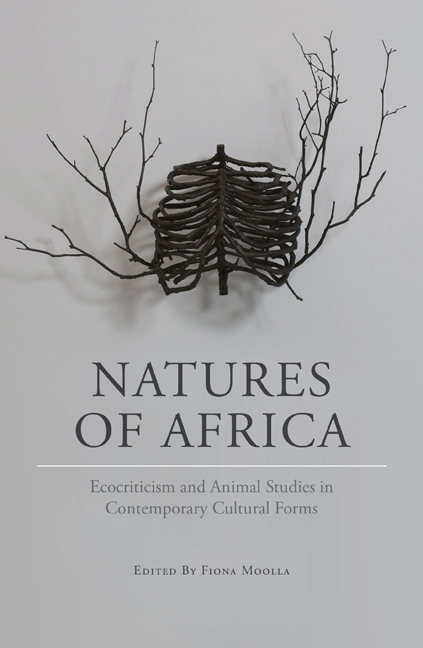Book contents
- Frontmatter
- Table of Contents
- Foreword
- Introduction
- 1 ‘Here is Some Baobab Leaf!’: Sunjata, Foodways and Biopiracy
- 2 Shona as a Land-Based Nature-Culture: A Study of the (Re)Construction of Shona Land Mythology in Popular Songs
- 3 The Environment as Significant Other: The Green Nature of Shona Indigenous Religion
- 4 Animal Oral Praise Poetry and the Samburu Desire to Survive
- 5 The Paradoxes of Voluntourism: Strategic Visual Tropes of the Natural on South African Voluntourism Websites
- 6 Towards an Ecocriticism in Africa: Literary Aesthetics in African Environmental Literature
- 7 Critical Intersections: Ecocriticism, Globalised Cities and African Narrative, with a Focus on K. Sello Duiker's Thirteen Cents
- 8 Navigating Gariep Country: Writing Nature-Culture in Borderline by William Dicey
- 9 Negotiating Identity in a Vanishing Geography: Home, Environment and Displacement in Helon Habila's Oil on Water
- 10 Human Masks? Animal Narrators in Patrice Nganang's Dog Days: An Animal Chronicle and Alain Mabanckou's Memoirs of a Porcupine
- 11 Nature, Animism and Humanity in Anglophone Nigerian Poetry
- 12 Animals, Nostalgia and Zimbabwe's Rural Landscape in the Poetry of Chenjerai Hove and Musaemura Zimunya
- About the authors
- Acknowledgements
- Notes
- Index
Foreword
Published online by Cambridge University Press: 10 May 2018
- Frontmatter
- Table of Contents
- Foreword
- Introduction
- 1 ‘Here is Some Baobab Leaf!’: Sunjata, Foodways and Biopiracy
- 2 Shona as a Land-Based Nature-Culture: A Study of the (Re)Construction of Shona Land Mythology in Popular Songs
- 3 The Environment as Significant Other: The Green Nature of Shona Indigenous Religion
- 4 Animal Oral Praise Poetry and the Samburu Desire to Survive
- 5 The Paradoxes of Voluntourism: Strategic Visual Tropes of the Natural on South African Voluntourism Websites
- 6 Towards an Ecocriticism in Africa: Literary Aesthetics in African Environmental Literature
- 7 Critical Intersections: Ecocriticism, Globalised Cities and African Narrative, with a Focus on K. Sello Duiker's Thirteen Cents
- 8 Navigating Gariep Country: Writing Nature-Culture in Borderline by William Dicey
- 9 Negotiating Identity in a Vanishing Geography: Home, Environment and Displacement in Helon Habila's Oil on Water
- 10 Human Masks? Animal Narrators in Patrice Nganang's Dog Days: An Animal Chronicle and Alain Mabanckou's Memoirs of a Porcupine
- 11 Nature, Animism and Humanity in Anglophone Nigerian Poetry
- 12 Animals, Nostalgia and Zimbabwe's Rural Landscape in the Poetry of Chenjerai Hove and Musaemura Zimunya
- About the authors
- Acknowledgements
- Notes
- Index
Summary
In her introduction, Fiona Moolla suggests that an African ecocriticism must be informed by specific material and cultural conditions on the continent, and not simply draw on a supposedly more universal postcolonial framework. As she notes, there have been regrettably few book-length ecocritical studies focused on Africa and, much of the time, ‘African environment and animals have been considered in monographs and edited volumes in a general postcolonial context together with criticism of other world literatures’. Moolla rightly insists on the need for close consideration of how ‘the natural world and animals have been active agents in African cultural forms’ and ‘fundamentally constitutive of the worldviews and lifeways that have created [African] cultural “texts”’. In this sense, the importance of The Natures of Africa is embedded not just in the individual chapters of the book, but also in how the collection as a whole points to common issues and concerns that can ground productive dialogues about African cultural production in the context of the environmental humanities.
At the same time, the collection is very much connected to postcolonialism through its focus on decolonising knowledge and representation. Such counter-discursive work need not engage directly with the historical experience of colonialism in Africa or even explicitly with what Derek Gregory (2004) terms ‘the colonial present’. However, it does challenge ways of perceiving and conceptualising the world rooted in the perspectives of those empowered by imperial modernity and serving to reproduce forms of domination. This intellectual project has two components. The first is to illuminate how dominant ways of processing the world have been shaped by colonial discourses of identity and geography, how they suppress or render invisible other (unsettling) forms of knowledge and perception, and how they reinforce uneven political relationships. The second path to decolonising knowledge entails the articulation of marginalised cultural perspectives and forms of knowledge that might enable resistance to imperialism and alleviate its violent effects. Although The Natures of Africa is engaged with both aspects of perspectival decolonisation, its links with the second, often more difficult, component are particularly striking.
- Type
- Chapter
- Information
- Natures of AfricaEcocriticism and Animal Studies in Contemporary Cultural Forms, pp. vii - xviPublisher: Wits University PressPrint publication year: 2016

